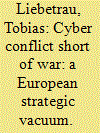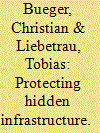| Srl | Item |
| 1 |
ID:
187498


|
|
|
|
|
| Summary/Abstract |
Cyber conflict short of war plays an increasingly important role in contemporary security politics. Dedicated to a study of three European NATO members – the Netherlands, France and Norway, this article expands the existing focus of the study of cyber conflict short of war beyond its dominating US context. It compares and assesses how the countries perceive and respond to a changing strategic environment characterised by increasing cyber conflict short of war. The analysis demonstrates that all three countries acknowledge that cyber operations short of war alter the strategic environment and challenge the idea of deploying offensive cyber capabilities as purely a warfare matter. However, it also identifies a strategic vacuum, as none of them have formulated strategies that describe in detail how military and intelligence entities are supposed to approach and manage the new strategic environment. The article asserts that the current lack of strategic guidance is a fundamental challenge that puts European societies at risk and undermines democratic governance as navigating the new space of strategic cyber competition is a significant challenge to contemporary European statecraft. It concludes by noting three avenues for how to ameliorate this situation and fill the vacuum.
|
|
|
|
|
|
|
|
|
|
|
|
|
|
|
|
| 2 |
ID:
177946


|
|
|
|
|
| Summary/Abstract |
In this article, we show how Annemarie Mol's notion of ontological politics helps to open up the research agenda for cyber security in Critical Security Studies. The article hence seeks to further the debate about STS and Critical Security Studies. The article's main claim is that the concept of ontological politics enables an engagement with the complex and transformative dynamics of ICT and the new security actors and practices that shape security politics in the digital age. By examining the virulent attacks executed by the Mirai botnet – one of the world's largest, fiercest, and most enduring botnets – we point to four aspects of cyber security that attention to the ontological politics of cyber security attunes us to: the proliferation and entanglement of security agencies, actors, sites, and spaces. These aspects of cyber security, we argue, are becoming increasingly prominent alongside the development of the Internet of Things (IoT) and 5G network technology. In conclusion, we discuss the wider security theoretical and normative-democratic implications of an engagement with the ontological politics of security by exploring three avenues for additional conversation between ontological politics and Critical Security Studies.
|
|
|
|
|
|
|
|
|
|
|
|
|
|
|
|
| 3 |
ID:
179281


|
|
|
|
|
| Summary/Abstract |
Undersea communication cables are the core critical infrastructure of the digital age. 99% of all transoceanic digital communication—financial transactions, emails, or voice messaging—is transported through undersea fiber-optic cables. The global submarine cable network is a critical infrastructure that does not receive the analytical attention it deserves. We argue that cable security is a core dimension of current and future international security governance. We present the first systematic survey of the academic discourses that investigate the politics, governance, and protection of submarine data cables. Three rather narrow literatures study the cables (1) as under threat from hybrid warfare and terrorism, or treat the cable network narrowly as a (2) technical or (3) regulatory problem. We demonstrate the need for broadening out the research agenda and addressing key questions of security governance and geopolitics of this increasingly critical infrastructure.
|
|
|
|
|
|
|
|
|
|
|
|
|
|
|
|